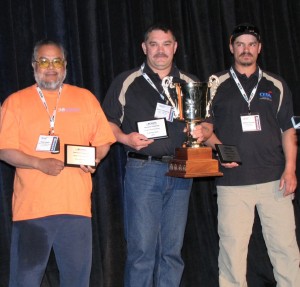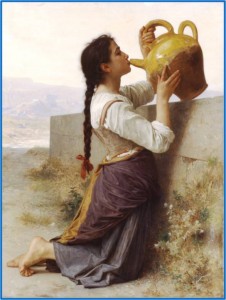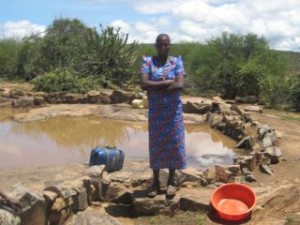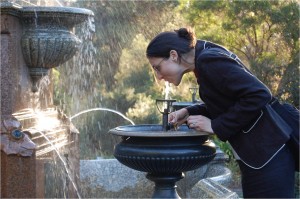“It isn’t pollution that’s harming the environment. It’s the impurities in our air and water that are doing it.” – Dan Quayle
Crammed in a cab with Bob Sanford and David Brooks, listening to adventure stories about Middle East river agreements. I jumped in with one of my few international water anecdotes. “An Ethiopian hydrologist told me that water security – for them – is five litres a day, per person, within a three kilometre walking distance.”
The driver gave a derisive cough. “That guy must have been from the countryside,” he said, shaking his head. “I’m from Addis Ababa. We used at least six litres, and we didn’t have to walk for it.”
Strolling from kitchen to bathroom, I might use 100 litres of pure, fresh water a day without giving a second thought. If I wander out and turn on my sprinklers, that might go to 1000. And I’m average!
Let’s raise a glass to drinking water: so cheap, so abundant, we wash our cars with it. If it weren’t for the empty plastic bottles lying around, water would be almost invisible.
Back at home, I asked some guys next to me at a restaurant what they thought about drinking water. “We don’t think about it. We don’t want to. We just want to be able to get it.” Tommy and Ken were executives from the auto industry, and after some discussion, they admitted to being skeptical about climate change, but aware there were problems out there. “Without water there’s no life. Look at the Dead Sea, it’s dying!”
Growing up in the mountains, my image of pure water is to stop and drink from a stream – cold and slightly gritty, tasting faintly of moss. The truth is (sadly) less poetic. My early thirst for raw water explains a childhood of stomach upsets, and an adult immunity to tourista.
BC’s water sources are wild – and wildly variable. Greater Vancouver has giant, protected catchment areas, surrounded by fences to keep stray hikers away from the reservoirs. Their water flows down to a fabled, massive new filtration plant.
At the other end of the spectrum, some small communities resist even chlorination. Like me, they love the taste of raw water.
In between, water utilities tap streams and aquifers, religiously sending weekly samples for pathogen testing; quietly, steadily delivering near-perfect water to your kitchen sink. “It’s the best deal in the world!” says Bob Hrasko, from the Black Mountain Irrigation District. “Only pennies a day, for all you can drink.”
May 13-19 is “Drinking Water Week” in BC. It’s a good time to hug your local water supplier. Buy ’em some flowers.

A winning team of the Operator Challenge event at the BC Water and Waste Association annual gathering. Photo: BCWWA
Drinking Water Week coincides with the run-off season in BC – “full freshet,” when snow-melt fills ditches and stream-banks. This is the season of water advisories, when fast-moving rivers carry loads of new silt, hiding microbes from sterilization. This is the season when water providers work full-tilt, so we can save our worries for other things.
I happened to be at a water conference in Vancouver in 2007 when a freak spring storm overwhelmed the existing treatment capacity. We awoke to a complete shut-down of the coffee-making industry in downtown Vancouver: an emergency water advisory, cutting at the core of urban productivity.
After comparing notes with the Ethiopian cab driver, the memory of stumbling conference delegates is humorous and pathetic, but there was a mood of real helplessness in the crowd milling around the locked Starbucks in the underground mall. Someone with a bottled water truck rescued us before the situation became desperate.
 There are still places in BC – some rural communities, some First Nation’s reserves – who struggle for potable water year-round. It’s not only a shortage of treatment plants, but a shortage of trained operators across Canada.
There are still places in BC – some rural communities, some First Nation’s reserves – who struggle for potable water year-round. It’s not only a shortage of treatment plants, but a shortage of trained operators across Canada.
So if you are feeling cranky this week, casting around dubiously for something to be grateful for; if you feel down on your luck; if you feel thirsty for something really special – go have a glass of water.
Here’s a movie about the secret ninja that patrols our mountains, helping suppliers keep water safe for the good people of the Okanagan. We call him, “Water Warrior.”




Thanks for taking the time to share this very simple message about water – it never ceases to amaze me how something that is so essential to life can be so under-valued, wasted and taken for granted by so many people in our part of the world.
My personal challenge to myself today is with every usage of water in the next 24 hours (eg. taking a shower, brushing my teeth, flushing the toilet, drinking my cup of coffee, washing my hands, washing my fruit and veggies, rinsing the sink ….) I will say ‘thank you for the water”.
And thank you, Daisy, for all your great work to protect and promote good, safe drinking water. Your message reminds me of an interview I once read from Humphrey Bogart. He said that when he was filming the African Queen, he never used water to brush his teeth, only whiskey!
Great stories about water realities around the world, Anna! Our daughter from Toronto just participated in a “From me to we” two week field visit to a Masai village in south-west Kenya. Part of her experience was joining village women on their daily walk for a couple of kilometers to the river for washing and drinking water….the “light” really came on for her about the preciousness of water and how we Canadians take it granted! It will be interesting to see how long this new appreciation lasts now that she’s returned to big city life in southern Ontario! Keep up your great work!
Thanks, Craig! I envy your daughter. One day I’d love to visit that part of the world. It is hard to not be lazy when we live in such abundance.
I wouldn’t count on that posited life-long immunity to water-borne disease based on having drunk from BC mountain creeks as a child…..
(My impression growing up was that giardia came into the world right on the heels of herpes and just before AIDS).
You are quite right, Julian. I bow to your adult-onset giardia experience. I should have said “apparent immunity.”
Me, too! I really thought it was preposterous when someone told me I could get sick drinking out of lakes and streams. I had been blissful in my ignorance.
I relate to this Water Warrior video. The mountain and stream scenes look like where I live. Water appreciation is very important and if we look, clearly evident as we, at Twin Lakes, rely on the creeks feeding the aquifer and the lake which we live around. The layers camouflaging where the water comes from are gone as we watch the water cycle closely year by year. We look beyond our tap.
The creeks, though, do not always feed the aquifer and the lakes here. Thankfully, this is a year of abundance.
The best way to appreciate water is to be without – we previously lived on property for 25 years with a well in Langley Municipality. We were often without water due to large tree branches falling causing hydro outages. Now we are at a different level of appreciation as we think how much snow pack is there, where is the ground water level and is the waterway free of debris. I guess it is called a deeper understanding and it is something we all need to get.
They say that amoebas are even worse than giardia.
Pingback: Mud-bogging and other ways we love the land too hard | | Building BridgesBuilding Bridges